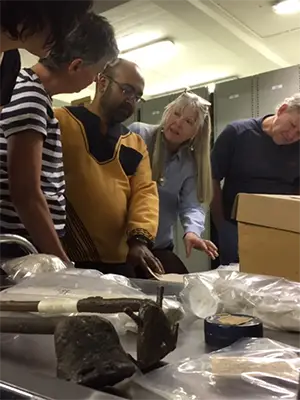The focus of my post-doctoral fellowship was to extend and translate the conceptual thinking behind the FHYA into a practical, digital project, namely the online exemplar. Developing the exemplar required, amongst other things, distilling project aims into exemplar functionality, researching the best software for the project and which standards and metadata to use to enable optimal searching and discovery. Under my guidance, the project team decided on dedicated open-source archival software, AtoM (Access to Memory), a robust and flexible framework that has been developed in conjunction with the International Council on Archives. The software is freely available for anyone to use and has a global community of users and developers. However, my research revealed that AtoM had certain epistemological limitations when it came to the southern African context, particularly when confronted with the challenges of tracking the colonial production of sources for periods before colonialism.

I devised a series of customisations to AtoM to address these limitations and managed the development and customisation of the chosen software to achieve the conceptual aims of the project. Customising the software to produce the exemplar was not without its challenges. For various reasons – including unreliable service providers, software developers and a lack of technical support in South Africa – the FHYA team decided to commission the original AtoM software developers, a Canadian company called Artefactual, to address any outstanding customisation issues and fine-tune the FHYA exemplar. The customised exemplar can now be used as online tool to facilitate research into the southern African past before colonialism. But these enquiries are limited by the normative concept of archive on which the AtoM software, and by extension, the FHYA exemplar is based. The culmination of the FHYA team’s work on the exemplar left unanswered questions and presented further challenges.
Current work with the APC
With the FHYA exemplar completed, I continue to work with the APC as a consultant. Towards the end of 2019, the FHYA team approached Professor Hussein Suleman of UCT’s Computer Science Department with a set of unresolved issues relating to the exemplar built using AtoM. The critique of AtoM is the basis the FHYA’s new partnership with Suleman, a professor of computer scientist who specialises in developing low-resource systems for digital archives and libraries that are financially and technologically sustainable.
With initial funding from Afridig, Suleman and the FHYA team are working with colleagues from the universities of the Witwatersrand, Cape Town and Pretoria, all of whom are developing projects that focus on the long past in southern Africa. Part of this collaboration is to develop Emandulo, a low-resource alternative to AtoM that takes into consideration the challenges of digital archives and libraries in Africa, alongside the conceptual concerns of research into the remote southern African past. Emandulo will serve as pioneering digital research infrastructure.
Professor Carolyn Hamilton and I are writing and publishing the results of our research on the FHYA. One of the outputs is a paper on methodological approaches for carrying out historiographical research in the digital age for a special edition of History in Africa entitled, "Digital Humanities and the Future of Chronicling the African Past". Another, for the Routledge Handbook on “Decolonizing the Digital Humanities”, critiques the established, normative concept of archive, and AtoM as the pre-eminent standards-based digital archival software on which it is based.

iAfrika Digital
I run iAfrika Digital, a digital agency that works with cultural institutions in Africa. We focus on African cultural content delivered in African languages and on mobile devices.
Publications
McNulty, G. 2022. Refiguring the Archive for Eras before Writing: Digital Interventions, Affordances and Research Futures. History in Africa.
Available HERE.
McNulty, G. 2022. Mkhize Historians Dispute the Past. In Archives of Times Past: Conversations about South Africa’s Deep History, Cynthia Kros, Helen Ludlow, John Wright and Mbongiseni Buthelezi, Eds. Wits University Press.
Details of the publication available HERE.
McNulty, G. 2018. Access, Skills, African Perspectives and ‘Development’? in Africa: Local Knowledge in Local Languages. In African Language Digital Media and Communication A. Salawu, Ed. Abingdon: Routledge. 11 – 30.
Details of the publication available HERE.
McNulty, G. 2016. ‘(Re)discovering the Correct History’: Tradition and Custom, the Archival Record and Identity in Contemporary KwaZulu-Natal in Identity and the Material Record in Southern KwaZulu-Natal in the Late Independent and Colonial Periods, Carolyn Hamtilton and Nessa Leibhammer, Eds. UKZN Press.
Details of the publication available HERE.
McNulty, G. and McNulty, N. Eds. 2015. The Digital Memory Toolkit. Available HERE (PDF).
McNulty, G. 2013. Tradition, Custom and Political Power in eThekwini, KZN. Available HERE.
McNulty, G. 2013. Chiefs, Tradition and Record-Making in the Last 150 Years. Available HERE.
McNulty, G. 2012. Archival Aspirations and Anxieties: Contemporary Preservation and Production of the Past in Umbumbulu, KwaZulu-Natal. South African Historical Journal. 65 (1): 44 – 69.
Available HERE.
Theses
McNulty, G. 2014, ‘Custodianship on the Periphery: Archives, Power and Identity Politics in Post-Apartheid Umbumbulu, KwaZulu-Natal’, PhD thesis, University of Cape Town, Cape Town. Available HERE.
McNulty, G. 2003, ‘The functions of dreams and visions in the Ibandla lalaNazaretha at Inanda’, MA thesis, University of Natal (now University of KwaZulu-Natal), Durban. Available HERE.